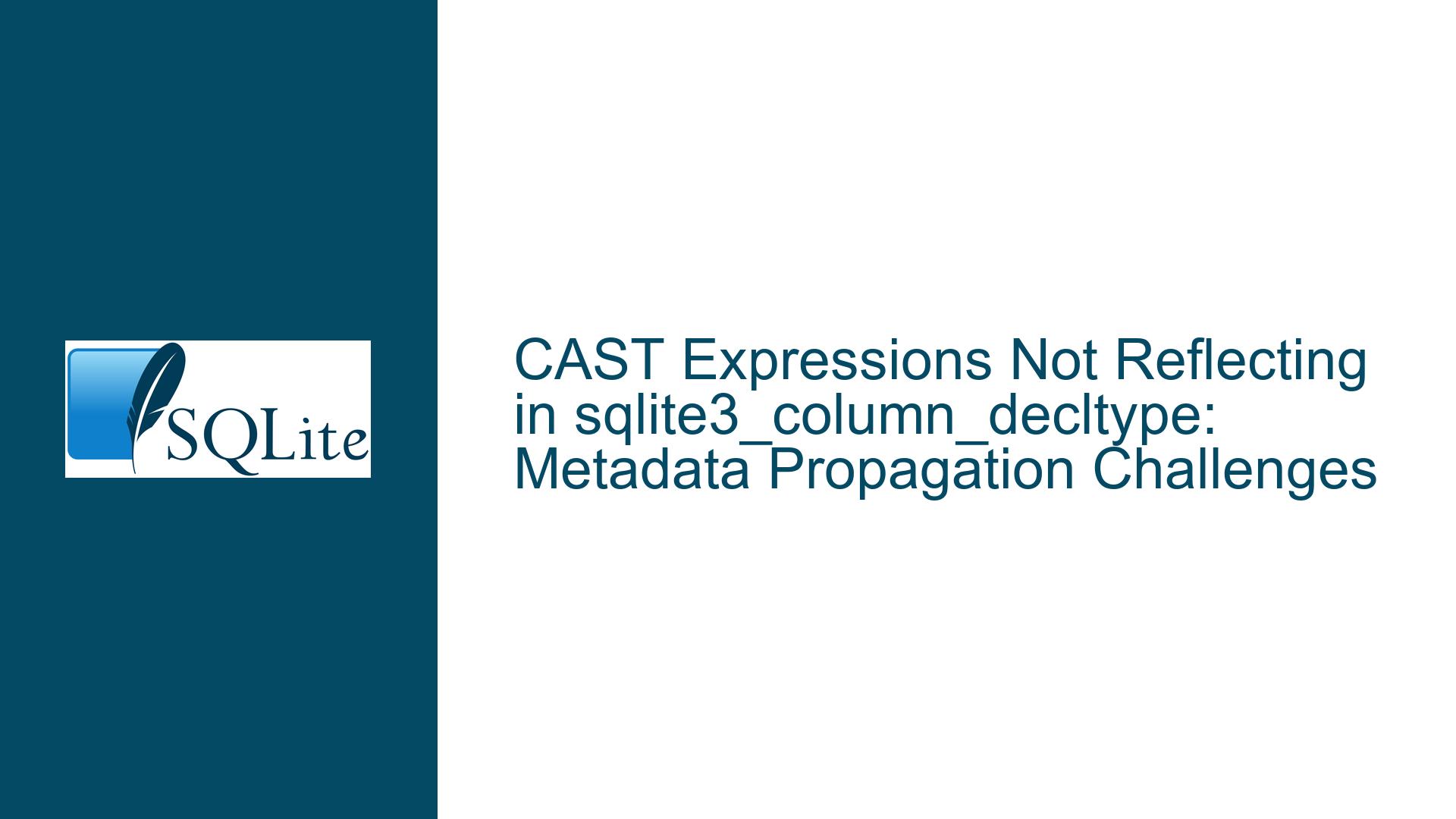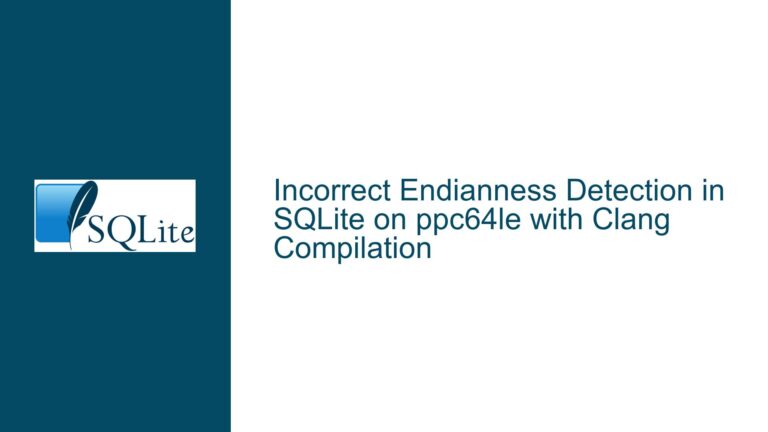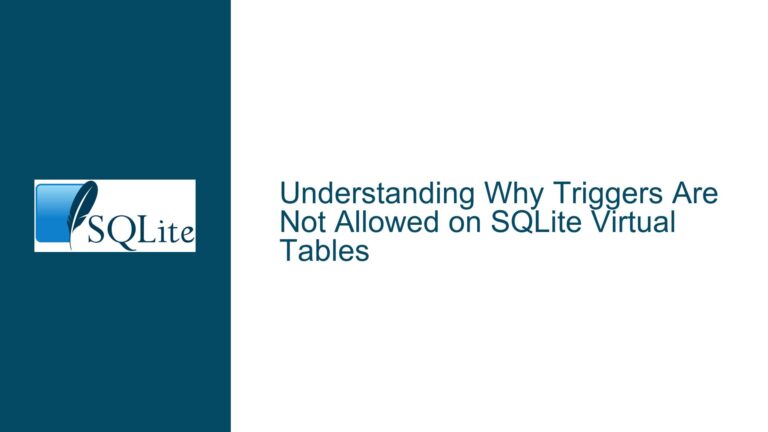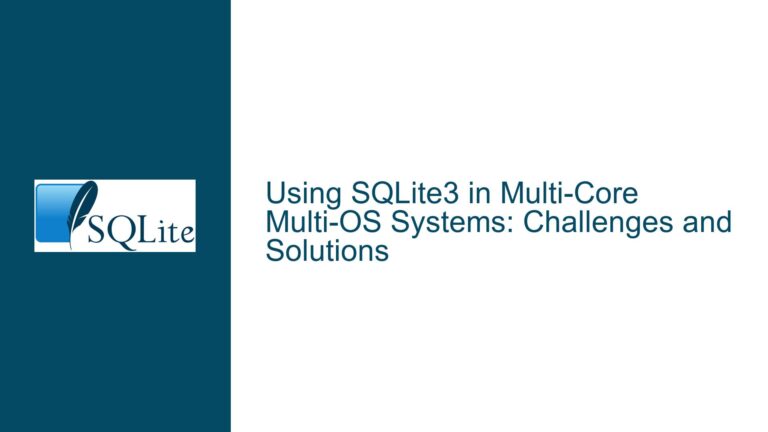CAST Expressions Not Reflecting in sqlite3_column_decltype: Metadata Propagation Challenges
Understanding Why CAST Types Are Missing from sqlite3_column_decltype Results
Issue Overview
The core issue revolves around SQLite’s sqlite3_column_decltype API function failing to propagate the type name specified in a CAST expression. For example, when a query includes SELECT CAST(d + 7 AS INT_DATE) FROM t, sqlite3_column_decltype returns NULL instead of INT_DATE. This behavior contrasts with column aliases (e.g., SELECT d + 7 AS INT_DATE), where sqlite3_column_decltype returns the alias name if the original column’s declared type is unavailable.
The problem impacts applications relying on sqlite3_column_decltype to automate type conversions between SQLite and higher-level languages (e.g., Python, Java). Without the declared type metadata, developers must manually map query results to application-specific types or use workarounds like aliasing. This undermines the utility of SQLite’s dynamic type system in scenarios where type hints are critical for data interpretation, such as date arithmetic, phone number formatting, or domain-specific serialization.
Key technical nuances include:
- SQLite’s Type Affinity System: Declared types in columns influence affinity (e.g.,
INT_DATEmaps toINTEGERaffinity), but expressions likeCASTdo not inherently carry forward user-defined type names. - Metadata Propagation Limits: SQLite’s
sqlite3_column_decltypeonly reflects the declared type of the original table column or the alias name. Expressions, includingCAST, are treated as runtime evaluations with no compile-time metadata retention. - Compatibility Constraints: Changing how
CASTinteracts withsqlite3_column_decltyperisks breaking existing applications that depend on the current behavior (e.g., expectingNULLfor non-column expressions).
Root Causes of Missing CAST Declared Types
1. SQLite’s Metadata Model Prioritizes Storage Over Semantics
SQLite’s design philosophy emphasizes flexibility in storage (manifest typing) over rigid type enforcement. The sqlite3_column_decltype API is intended to reflect the original schema declaration of a column, not runtime-calculated expressions. When a CAST is applied, the result is an ephemeral value without a schema-backed declaration. Thus, sqlite3_column_decltype has no mechanism to associate the CAST type name with the result.
2. Type Affinity Conflicts with User-Defined Naming Conventions
User-defined type names (e.g., INT_DATE, TEXT_PHONE_NUMBER) are designed to influence affinity (e.g., INTEGER or TEXT). However, when used in CAST expressions, these names are parsed for affinity determination but discarded afterward. For example, CAST('123' AS PHONE_NUMBER) assigns NUMERIC affinity (since PHONE_NUMBER isn’t a recognized type) but does not retain PHONE_NUMBER as metadata. This creates a mismatch: the affinity guides storage/processing, but the semantic type name is lost.
3. Compile-Time vs. Runtime Metadata Resolution
SQLite determines declared types at prepare time, not execution time. CAST expressions, however, involve runtime evaluation. Propagating the CAST type name to sqlite3_column_decltype would require extending the prepared statement metadata to include arbitrary expression annotations, which SQLite’s lightweight architecture avoids.
4. Workaround-Driven Design Limitations
The current workaround—using column aliases like SELECT d + 7 AS INT_DATE—exploits the fact that sqlite3_column_decltype falls back to the column name if no declared type exists. However, this conflates naming (a presentational concern) with typing (a semantic concern). It forces developers to overload column names with type hints, leading to fragile code and naming conflicts.
Resolving Missing CAST Declared Types: Strategies and Tradeoffs
1. Leverage Column Aliases with Type-Embedded Names
Solution: Use column aliases to explicitly encode type information.
Implementation:
SELECT d + 7 AS "d [INT_DATE]" FROM t;
In code, parse the column name to extract the type hint:
const char *name = sqlite3_column_name(stmt, 0);
char *type = extract_decltype_from_name(name); // e.g., parse "[INT_DATE]"
Pros:
- Works with existing SQLite versions.
- Compatible with tools like Python’s
sqlite3module (usingPARSE_COLNAMES).
Cons:
- Pollutes column names with type metadata.
- Requires consistent naming conventions across queries.
2. Use Temporary Tables to Preserve Declared Types
Solution: Materialize query results into a temporary table with explicit column types.
Implementation:
CREATE TEMP TABLE temp_results (result INT_DATE);
INSERT INTO temp_results SELECT d + 7 FROM t;
SELECT result FROM temp_results;
Pros:
sqlite3_column_decltypereturnsINT_DATEfor theresultcolumn.- Avoids alias-based hacks.
Cons:
- Adds overhead for table creation and data duplication.
- Not feasible for large datasets or frequent queries.
3. Custom SQL Functions to Annotate Declared Types
Solution: Extend SQLite with a custom function to set the declared type.
Implementation:
// Define a function that returns its first argument but annotates the decltype
static void set_decltype(sqlite3_context *ctx, int argc, sqlite3_value **argv) {
sqlite3_result_value(ctx, argv[0]);
}
// Register the function with a declared type
sqlite3_create_function_v2(
db, "ANNOTATE_TYPE", 2, SQLITE_UTF8, NULL,
set_decltype, NULL, NULL, NULL
);
Usage:
SELECT ANNOTATE_TYPE(d + 7, 'INT_DATE') FROM t;
Pros:
- Full control over declared types.
- No schema changes required.
Cons:
- Requires custom C extensions.
- Not portable across environments.
4. Adopt Strict Typing with Domain-Specific Functions
Solution: Use SQLite’s CHECK constraints and strict tables to enforce types.
Implementation:
CREATE TABLE t (d INT_DATE CHECK (TYPEOF(d) = 'integer'));
Pros:
- Ensures data integrity at the schema level.
- Works with
sqlite3_column_decltypefor table columns.
Cons:
- Does not solve the problem for expressions.
- Limits flexibility in dynamic typing.
5. Advocate for SQLite API Extensions
Proposal: Introduce a new compile-time option (e.g., SQLITE_ENABLE_CAST_DECLTYPE) to propagate CAST types to sqlite3_column_decltype.
Technical Considerations:
- Modify the parser to track
CASTtype names in the parse tree. - Extend the prepared statement metadata to include these names.
- Guard the feature behind a compile-time flag to avoid breaking compatibility.
Community Engagement:
- Submit a feature request to the SQLite team with use cases (e.g., Python type converters, reporting tools like BIRT).
- Highlight the opt-in nature of the proposal to alleviate compatibility concerns.
Pros:
- Native support for
CAST-based declared types. - No workarounds needed.
Cons:
- Dependent on SQLite team approval.
- Long timeline for implementation and adoption.
Final Recommendations
For most applications, combining column aliases with a naming convention (e.g., [INT_DATE]) provides a pragmatic balance between simplicity and functionality. Tools like Python’s sqlite3 module already support this via PARSE_COLNAMES, automating type conversions without schema modifications.
For high-performance or type-sensitive systems, custom SQL functions offer finer control but require deeper integration with SQLite’s API.
Long-term, advocating for API extensions to propagate CAST types aligns with SQLite’s ethos of optional, modular features. Developers facing this issue should document their use cases and engage the SQLite community to demonstrate demand for such enhancements.






